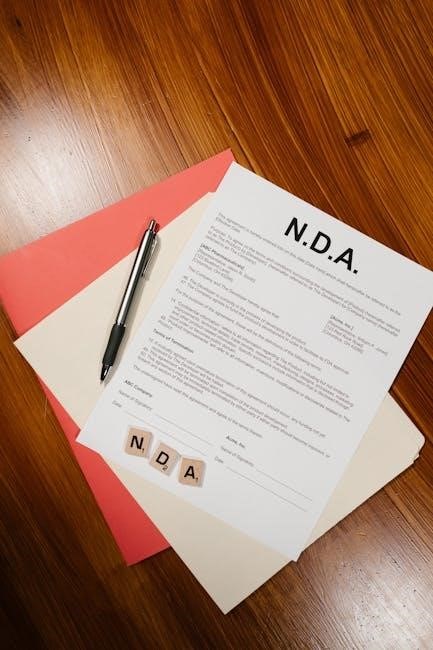A real estate confidentiality agreement is a legally binding document protecting sensitive information, such as financial details and property data, ensuring all parties maintain confidentiality during real estate transactions.
1.1 Definition and Purpose
A real estate confidentiality agreement, often in PDF format, is a legally binding document designed to protect sensitive information shared during property transactions. Its primary purpose is to ensure that confidential details, such as financial data, property valuations, and business strategies, remain private between the parties involved. This agreement is essential for maintaining trust and preventing unauthorized disclosure, which could harm negotiations or competitive advantages. It outlines the obligations of both parties to safeguard shared information, ensuring transparency and compliance with legal standards. By defining the scope of confidentiality, it helps prevent misuse of critical data, fostering a secure environment for real estate dealings.
1.2 Importance in Real Estate Transactions
A real estate confidentiality agreement plays a crucial role in safeguarding sensitive information during property transactions. It prevents the unauthorized disclosure of financial data, property valuations, and strategic plans, which could compromise negotiations or competitive positions. By ensuring confidentiality, it builds trust between buyers, sellers, and other parties involved, fostering a secure environment for discussions. This agreement is especially vital in high-stakes transactions, where leaked information could impact market dynamics or business relationships. It also protects intellectual property and proprietary information, ensuring that only authorized individuals access critical data. Ultimately, a real estate confidentiality agreement supports the integrity and fairness of the transaction process, allowing all parties to negotiate confidently without fear of exploitation or misuse of shared information.
Types of Real Estate Confidentiality Agreements
Real estate confidentiality agreements include unilateral NDAs, mutual NDAs, and buyer-specific agreements, each tailored to protect sensitive information during property transactions and negotiations.
2.1 Unilateral Non-Disclosure Agreements (NDAs)
A unilateral NDA is a one-way agreement where one party, typically the buyer, agrees not to disclose the seller’s confidential information. This type of NDA is commonly used in real estate transactions to protect sensitive details, such as financial data, property appraisals, or business strategies, shared by the seller. The buyer is obligated to maintain confidentiality, while the seller has no such reciprocal obligation. Unilateral NDAs are particularly important in commercial real estate deals, where protecting proprietary information is crucial. They ensure that potential buyers cannot misuse sensitive information if the transaction does not proceed. This agreement is essential for safeguarding the seller’s competitive advantage and maintaining trust during negotiations. It is often tailored to the specific needs of the property and the parties involved.
2.2 Mutual Non-Disclosure Agreements (NDAs)
A mutual NDA is a two-way agreement where both parties agree not to disclose each other’s confidential information. This type of NDA is less common in real estate but is used in situations where both the buyer and seller may share sensitive information. For example, in joint ventures or partnerships, both parties may need to exchange confidential data, such as financial projections or property development plans. Mutual NDAs ensure that both sides are equally bound by confidentiality obligations, creating a balanced and reciprocal relationship. This arrangement is particularly useful when collaboration requires open communication and trust. By protecting both parties’ interests, mutual NDAs foster a collaborative environment while safeguarding sensitive information from unauthorized disclosure. They are often used in complex transactions where mutual trust and transparency are essential. This ensures that neither party can exploit the other’s confidential information for unfair advantage.
2.3 Real Estate Buyer Non-Disclosure Agreements
A real estate buyer non-disclosure agreement (NDA) is a unilateral contract where the buyer agrees to protect the seller’s confidential information. This agreement is often required when a seller shares sensitive details about a property, such as financial data, operational information, or future plans, to assess the buyer’s interest. The NDA ensures that the buyer cannot disclose this information to third parties or use it for unauthorized purposes. It typically outlines the scope of confidentiality, the duration of the obligation, and the consequences of breaching the agreement. This protects the seller’s competitive advantage and maintains privacy during negotiations. Buyers are usually barred from sharing such information without written consent, ensuring trust and fairness in the transaction process. This type of NDA is essential in maintaining the integrity of real estate dealings.

Key Clauses in a Real Estate Confidentiality Agreement
Essential clauses include confidentiality obligations, exclusions from confidential information, agreement duration, and requirements for returning or destroying sensitive data, ensuring clarity and compliance for all parties involved.
3.1 Confidentiality Obligations
Confidentiality obligations are the core of a real estate confidentiality agreement, legally binding parties to protect shared sensitive information. These obligations require all parties to maintain the secrecy of disclosed data, such as financial details, property valuations, or business strategies, ensuring it is not shared with unauthorized third parties. The scope of these obligations is clearly defined to prevent misuse and specifies the duration for which confidentiality must be upheld. Breach of these obligations can lead to legal consequences, emphasizing the importance of adherence. Such clauses ensure transparency and trust between parties, safeguarding their interests during negotiations or transactions. They are essential for maintaining professional integrity and preventing potential disputes. Proper enforcement of these obligations is crucial for the agreement’s effectiveness.
3.2 Exclusions from Confidential Information
Exclusions from confidential information are specific exceptions outlined in a real estate confidentiality agreement, identifying data not subject to confidentiality obligations. These exclusions typically include information already publicly available, data independently developed by the recipient, or information legally required to be disclosed by court order. Additionally, any information obtained from third parties without breach of confidentiality may be excluded. These exclusions prevent the agreement from being overly broad and ensure that parties are not unfairly restricted. They balance the need for confidentiality with the practical realities of business operations and legal requirements. Properly defining exclusions is crucial to avoid disputes and ensure clarity in the agreement’s scope.
3.3 Duration of the Agreement
The duration of a real estate confidentiality agreement outlines the time period during which the confidentiality obligations remain in effect. This term is typically specified in the agreement and can vary depending on the nature of the transaction. Once the agreement expires, the parties are no longer bound by its terms unless explicitly stated otherwise. However, certain provisions, such as the obligation to maintain confidentiality, may continue beyond the agreement’s termination. It is essential to clearly define the duration to avoid ambiguity and ensure all parties understand their ongoing responsibilities. The agreement may also specify conditions under which the obligations cease or expire, providing clarity on the timeline for confidentiality. Properly defining the duration ensures that the agreement remains enforceable and aligns with the needs of the transaction.
3.4 Return or Destruction of Confidential Information
The clause regarding the return or destruction of confidential information ensures that all sensitive materials shared during the real estate transaction are appropriately handled after the agreement terminates. Upon expiration or termination, the receiving party is typically required to either return all confidential documents to the disclosing party or destroy them, depending on the terms agreed upon. This provision helps protect the disclosing party’s sensitive information from unauthorized use or disclosure. The agreement may also specify the method of destruction or return, ensuring confidentiality is maintained. In some cases, the receiving party may be allowed to retain copies for legal or compliance purposes, provided they continue to uphold confidentiality obligations. This clause is critical for safeguarding sensitive data and preventing potential breaches;

The Role of Confidentiality in Real Estate Transactions
Confidentiality is crucial in real estate transactions to protect sensitive financial and property-related information, ensuring privacy and trust between all parties involved in the deal.
4.1 Protecting Sensitive Financial Information
In real estate transactions, financial information such as property revenue, taxes, and investor details is often shared. A confidentiality agreement ensures this data remains private, preventing misuse by competitors or third parties. By legally binding all parties, it safeguards the seller’s financial interests and maintains a competitive edge. This protection is especially vital in commercial deals where sensitive figures can impact negotiations. The agreement outlines clear restrictions on disclosure, ensuring that only authorized individuals access the information. This fosters trust and confidence, allowing parties to negotiate openly without fear of financial exposure. Thus, it plays a key role in maintaining the integrity and security of the transaction process.
4.2 Safeguarding Property-Related Data
Real estate confidentiality agreements play a crucial role in safeguarding property-related data, such as details about the property’s condition, future development plans, or specific features. This ensures that sensitive information shared during negotiations or inspections remains confidential and is not disclosed to unauthorized parties. By preventing unauthorized access, the agreement protects the property’s value and the privacy of the owner. It also ensures that potential buyers or tenants do not misuse the information for personal gain or competitive advantage. Breaching the agreement can lead to legal consequences, emphasizing the importance of compliance. This protection fosters trust and transparency between all parties involved, ensuring smooth and secure real estate transactions. The agreement thus serves as a vital tool in maintaining the integrity of property-related discussions and data sharing.
4.3 Maintaining Competitiveness in Negotiations
Real estate confidentiality agreements are essential for maintaining competitiveness in negotiations by preventing the misuse of sensitive information. When sellers disclose financial details, property valuations, or strategic plans to potential buyers, the agreement ensures this information is not shared with competitors or used to gain an unfair advantage. This protection allows sellers to negotiate from a position of strength, knowing their confidential data is secure. It also ensures that all parties operate on a level playing field, fostering fair competition. Breaching the agreement can result in legal consequences, further deterring the misuse of information. By safeguarding proprietary data, the agreement promotes transparency and trust while maintaining the integrity of the negotiation process. This ensures that all parties can engage in discussions confidently, without fear of their sensitive information being compromised.

How to Create a Real Estate Confidentiality Agreement
Create a real estate confidentiality agreement by outlining the parties, defining confidential information, specifying exclusions, and establishing terms for handling and returning sensitive data securely.
5.1 Identifying the Parties Involved
Identifying the parties involved is the first step in creating a real estate confidentiality agreement. This section clearly outlines who the parties are, such as the seller, buyer, or their representatives; It ensures that all individuals or entities bound by the agreement are explicitly named, providing clarity and legal validity. The parties’ roles, such as “Disclosing Party” or “Receiving Party,” are defined to establish responsibilities. Including contact information and legal representation details is also common. This section is crucial for ensuring that all parties understand their obligations and the scope of the agreement. Proper identification prevents ambiguity and strengthens the enforceability of the confidentiality terms. It sets the foundation for the rest of the agreement, ensuring all parties are accountable for maintaining confidentiality.
5.2 Defining the Scope of Confidential Information
Defining the scope of confidential information is essential to ensure clarity and prevent misunderstandings. This section outlines what constitutes confidential information, such as financial details, property data, business strategies, or proprietary information. It specifies that all shared information, whether written, oral, or electronic, is protected. Including examples like revenue, tax documents, or marketing plans helps clarify the boundaries. This definition ensures that both parties understand what information requires protection and what does not. By clearly delineating the scope, the agreement avoids ambiguity and provides a clear framework for handling sensitive data. This section is critical for establishing mutual understanding and ensuring that all parties adhere to the confidentiality terms outlined in the agreement. Properly defining the scope strengthens the agreement’s enforceability and protects the interests of all involved.
5.3 Including Necessary Exceptions
Including necessary exceptions ensures the agreement remains fair and practical. Common exceptions include disclosures required by law, information already in the public domain, and data obtained from third parties. Legal requirements may compel disclosure, and such instances should be clearly outlined. Publicly available information, such as property records, is typically exempt. Additionally, parties should not be restricted from using information received from other sources unrelated to the agreement. These exceptions balance confidentiality obligations with real-world practicalities, ensuring the agreement does not impose undue restrictions. Clearly defining exceptions prevents disputes and ensures compliance with legal standards. It also maintains the agreement’s enforceability by addressing scenarios where confidentiality cannot reasonably apply. Properly including exceptions safeguards both parties’ interests while fostering a transparent and fair transaction process. This section is crucial for a well-rounded and legally sound confidentiality agreement.
5.4 Specifying the Term and Termination Clause
Specifying the term and termination clause is essential to define the duration of the confidentiality agreement and outline the conditions under which it can be terminated. The term should clearly state the start and end dates of the agreement, ensuring obligations are time-bound rather than indefinite. The termination clause should detail how either party can end the agreement, such as through written notice. It’s important to clarify whether confidentiality obligations persist after termination, especially for sensitive information. Including these specifics prevents indefinite obligations and provides clarity for both parties. A well-drafted term and termination clause ensures the agreement remains enforceable while protecting both parties’ interests. This section is critical for maintaining fairness and avoiding potential disputes. Properly defining these elements ensures the agreement aligns with the transaction’s timeline and objectives.

Legal Implications of a Real Estate Confidentiality Agreement
A real estate confidentiality agreement is a binding contract protecting sensitive information and ensuring compliance with legal standards, essential for maintaining trust and integrity in transactions.
6.1 Enforcement of the Agreement
A real estate confidentiality agreement is legally enforceable, ensuring parties adhere to its terms. Breaches can lead to legal consequences, including injunctions or monetary damages. Courts typically uphold these agreements if they are reasonable in scope and duration. Enforcement ensures that confidential information remains protected, maintaining trust and fairness in real estate transactions. Both parties must comply with the agreed terms to avoid legal repercussions. This legal framework provides a reliable safeguard for sensitive information, ensuring that disclosures made during negotiations or due diligence are not misused. Proper enforcement of the agreement is crucial for maintaining the integrity of real estate dealings and upholding the confidentiality of all parties involved;
6.2 Consequences of Breach
Breaching a real estate confidentiality agreement can result in severe legal and financial consequences. The injured party may seek injunctive relief to prevent further disclosure or misuse of confidential information. Monetary damages, including compensatory and punitive damages, may be awarded to compensate for losses caused by the breach. In some cases, the breaching party may also face legal action for misrepresentation or fraud. Additionally, a breach can damage the offending party’s reputation, undermining their credibility in future transactions. Courts generally enforce these agreements rigorously, ensuring that confidentiality obligations are upheld. It is crucial for all parties to adhere to the terms of the agreement to avoid these costly and reputation-damaging consequences. Breaches are taken seriously, as they can compromise sensitive information and destabilize real estate negotiations.
6.3 Compliance with Local Laws and Regulations
Real estate confidentiality agreements must comply with local laws and regulations to ensure enforceability and validity. These agreements are governed by the jurisdiction in which the real estate transaction occurs, and parties must adhere to applicable statutes and legal standards. Compliance involves ensuring that the agreement does not violate any privacy laws, competition laws, or other relevant regulations. In some jurisdictions, specific disclosures or clauses may be required to make the agreement legally binding. Additionally, electronic signatures and digital platforms used to execute the agreement must comply with local electronic transaction laws. Non-compliance can result in the agreement being deemed unenforceable or exposing parties to legal penalties. Legal counsel should review the agreement to ensure it aligns with all relevant laws and regulations, safeguarding the interests of both parties involved in the real estate transaction.

Real Estate Confidentiality Agreement Templates
Real estate confidentiality agreement templates are readily available for both commercial and residential transactions, offering customizable options to suit specific needs and ensure compliance with legal standards.
7.1 Commercial Real Estate Confidentiality Agreement Templates
Commercial real estate confidentiality agreement templates are specialized documents designed to protect sensitive information in business property transactions. These templates typically include clauses addressing financial data, property details, and business strategies. They are customizable to fit the specific needs of buyers, sellers, or investors. Key elements often cover non-disclosure obligations, exclusions, and termination terms. Electronic signatures are commonly integrated for efficiency. These templates ensure that confidential information shared during negotiations, inspections, or due diligence remains protected. They are essential for maintaining privacy and preventing unauthorized use of sensitive data. By using these templates, parties can streamline the process while safeguarding their interests. They are widely available online and can be adapted to comply with local laws and regulations.
7.2 Residential Real Estate Confidentiality Agreement Templates
Residential real estate confidentiality agreement templates are designed to safeguard sensitive information during home buying or rental transactions. These templates are less complex than their commercial counterparts but equally vital for protecting privacy. They typically cover financial details, property condition reports, and personal information shared between buyers, sellers, or tenants. The agreements often outline the responsibilities of all parties involved and specify the duration of confidentiality. Residential templates may also include clauses regarding inspections and disclosures. Electronic signatures are increasingly used to streamline the process. These templates help prevent unauthorized sharing of personal or property-related data, ensuring that negotiations remain private. They are widely available online and can be customized to meet specific needs while complying with local real estate regulations.
7.3 Electronic Signatures and Digital Platforms
Electronic signatures and digital platforms have revolutionized the execution of real estate confidentiality agreements, offering convenience and efficiency. Platforms like Jotform Sign enable parties to create, share, and sign agreements remotely, eliminating the need for physical meetings. Digital tools ensure that all signatories can review and execute documents quickly, streamlining the process. Electronic signatures are legally binding in many jurisdictions, provided they meet specific requirements. These platforms often include features for tracking document status and sending reminders, ensuring timely execution. Digital storage options also provide secure access to agreements, reducing the risk of lost paperwork. This modern approach not only accelerates transactions but also enhances security and accessibility, making it a preferred method for real estate professionals and clients alike. The use of electronic signatures is particularly beneficial for long-distance transactions, ensuring seamless communication and agreement execution;

Best Practices for Using a Real Estate Confidentiality Agreement
Ensure clarity, review terms, and understand obligations before signing. Regular updates and legal compliance are crucial to maintain effectiveness and protect sensitive information in real estate transactions.
8.1 Understanding the Terms Before Signing
Before signing a real estate confidentiality agreement, it’s crucial to thoroughly understand all terms. This includes identifying what information is deemed confidential and the obligations of both parties. Understanding the scope ensures that neither party inadvertently breaches the agreement. Legal counsel should review the document to clarify any ambiguities. Additionally, knowing the duration of confidentiality and any exceptions is vital. This step helps prevent future disputes and ensures compliance with the agreement’s requirements. Proper comprehension of the terms fosters trust and transparency between the parties involved in the transaction. It also safeguards against unintended disclosures of sensitive information. Always seek professional advice if any clauses are unclear.
8.2 Ensuring Clarity in the Agreement

Ensuring clarity in a real estate confidentiality agreement is essential to prevent misunderstandings and potential disputes. The language used should be clear, precise, and free from ambiguity, defining exactly what constitutes confidential information. All terms and conditions must be explicitly stated, including any exceptions or exclusions. This clarity ensures both parties fully understand their obligations and the scope of the agreement. Legal experts often recommend reviewing the document to eliminate any vague terms. Additionally, including specific examples of confidential information, such as property revenue or financial details, can further enhance clarity. By ensuring the agreement is straightforward and unambiguous, both parties can proceed with confidence, knowing their interests are protected. This transparency fosters trust and ensures smooth real estate transactions. Clarity is key to a legally sound and enforceable agreement.
8.3 Regular Review and Updates
Regular review and updates of a real estate confidentiality agreement are crucial to ensure its relevance and effectiveness. Laws, market conditions, and business needs can change, requiring adjustments to the agreement. Periodically reviewing the document helps identify outdated clauses and aligns it with current legal standards. It is recommended to involve legal counsel during this process to ensure compliance and enforceability. Updates should also reflect any changes in the parties’ roles or the scope of confidential information. A well-maintained agreement protects both parties’ interests and minimizes potential disputes. Proactive reviews demonstrate a commitment to transparency and fairness, fostering trust in the real estate transaction. Regular updates ensure the agreement remains a robust tool for safeguarding sensitive information.
